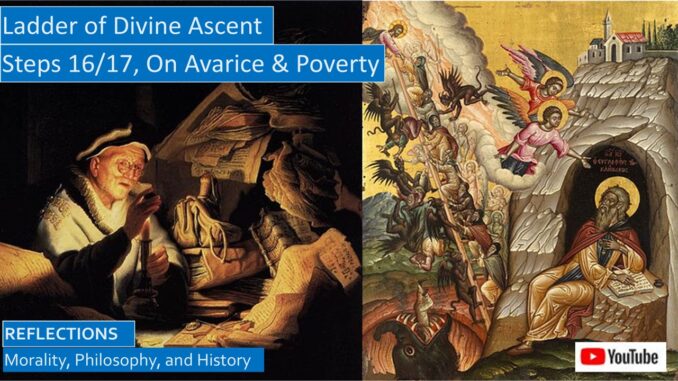
How does the sin of avarice compare to the sin of gluttony?
How does avarice corrupt our love for our neighbor?
Is what St John Climacus terms non-possessiveness the opposite of avarice?
Is non-possessiveness equivalent to poverty?
Why do we feel so violated when others steal from us, even when it is their poverty that tempts them?
LADDER OF DIVINE ASCENT, AVARICE VS NON-POSSESSIVENESS
In the Bible, the important commandments are listed many times, in both their positive and negative forms, but when a negative command is immediately followed by its positive form, we know that this is an important command. St John Climacus has already mentioned detachment and non-possessiveness many times. On the sixteenth rung, he warns us against avarice, the love of money, while on the next rung he teaches us to be detached, to not love our possessions.
STEP 16: ON AVARICE
These are important rungs on the ladder. Why do we feel so violated when those close to us steal from us? Many find this an offense impossible to forgive. When a single mom who does not work steals or passes bad checks to feed their children, rarely does the store manager or owner pity their hungry children. Even if they are lazy, even if they left their husband for trivial reasons, does this justify a harsh punishment that harms their children?
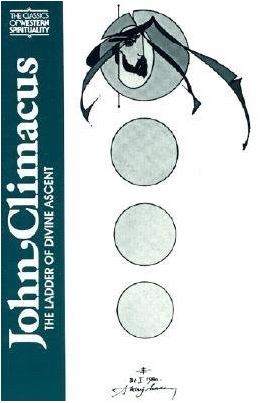
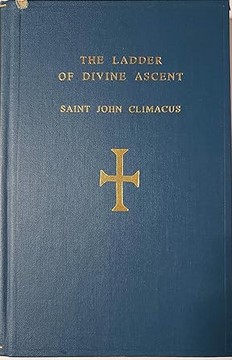
In our church, we had a lady living in Section 8 housing visit our church who spoke bad English, and who was just not welcome. Her pre-teen daughter was visibly uncomfortable sitting next to her. At coffee hour, the church ladies prominently displayed the lunch offering basket and nastily told her she needed to contribute to enjoy lunch. I put in ten dollars to cover them, and later asked the priest, are we like Denny’s, where if you do not pay, you do not eat? He kindly responded that she had been caught a year before rifling through purses in the restroom, that you could only expect so much from people, that it took all his powers of persuasion to prevent his parishioners from banning her entirely. So, I suppose their tolerating her presence was forgiveness of sorts.
So, with this story in mind, we read about what St John Climacus teaches us:
Step 16.2. “Avarice, or love of money, is the worship of idols, a daughter of unbelief, an excuse for infirmities, a foreboder of old age, a harbinger of drought, a herald of famines.”
Avarice is the worst kind of drought and famine, for it is drought and famine amidst plenty. A Jewish story tells of a man who toured Hell, where he saw a huge banquet hall, with long tables lined with souls, with each soul ogling the plates heaped with roast beef, sausage, breads, fruits, and pies. This sumptuous meal tormented each one, all were starving, for they had no elbows to feed themselves. Then he toured an identical banquet hall in Heaven, with long tables with plates heaped with roast beef, sausage, breads, fruits, and pies, but here the mood of these souls was joyous! Like those souls in Hell, they had no elbows, but these souls were joyous because they were feeding each other.[1]
Father Vassilios teaches us: “Just as gluttony is the passion that distorts our definition of need in terms of food and drink, avarice is the passion that distorts our definition of need in terms of money and luxury.”
St John Climacus teaches us:
Step 16.3. “The lover of money sneers at the Gospel and is a willful transgressor. He who has attained to love scatters his money. But he who says that he lives for love and for money has deceived himself.”
How can modern man follow this advice? Is our saint suggesting that we sin when we save for our retirement? Or can we simply follow CS Lewis’ sage advice, and give until it hurts?
Summary of CS Lewis’ Mere Christianity, WWII Ecumenical Broadcast: Morality Not Polemics
https://seekingvirtueandwisdom.com/summary-of-cs-lewis-mere-christianity-wwii-ecumenical-broadcast-morality-not-polemics/
https://youtu.be/6-Hc4X0NN8k
Once I remember filling up at a gas station when a happy though destitute couple approached, asking a man filling up his expensive truck for money so they could fill her husband’s prescription. He scorned them for their laziness, but I figured that at worst they had gone through a lot of trouble assembling their props, so I gave them twenty dollars. They then immediately crossed the street to the drugstore. Perhaps their condition was temporary, I never saw them beg after that, perhaps after filling his prescription he slowly recovered, both physically and, after he was again able to work, financially.
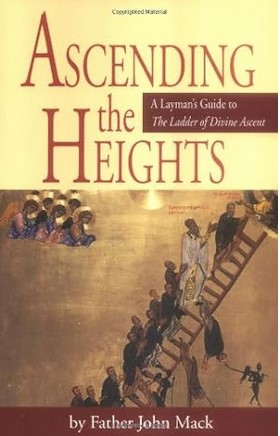
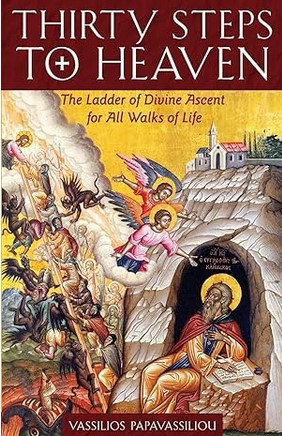
As Father Vassilios reminds us: “Many Church Fathers teach us that to give from our poverty is more valuable in God’s eyes than to give from our abundance.”
Father Vassilios has several quotes from St Basil’s works on Social Justice, including “Are you poor? You know someone who is even poorer.” “Do not shrink from giving the little you have; do not prefer your own benefit to remedying the common distress.”
St Basil also teaches us: “The more you abound in wealth, the more you lack in love.”
Father Vassilios in his commentary on these steps of the Ladder of Divine Ascent quotes extensively from St Basil the Great’s homilies on Social Justice, including the Parable of the Rich Man, and on assisting the poor during a famine.
Was St Basil Woke? Basil the Great On Social Justice, Homily To the Rich Man
https://seekingvirtueandwisdom.com/st-basil-the-great-on-social-justice/
https://youtu.be/PT_I5IrZGzY
Was St Basil WOKE? St Basil the Great On Social Justice, Parable of the Rich Fool
https://seekingvirtueandwisdom.com/was-st-basil-woke-st-basil-the-great-on-social-justice-parable-of-the-rich-fool/
https://youtu.be/UDQIZ81VfsY
St Basil on Social Justice: Assisting the Poor During a Famine in a Roman Province
https://seekingvirtueandwisdom.com/st-basil-on-social-justice-assisting-the-poor-during-a-famine-in-a-roman-province/
https://youtu.be/c8YXs7y4RrU
St Basil the Great On Envy
http://www.seekingvirtueandwisdom.com/st-basil-on-envy/
https://youtu.be/XnFUrFKoF7s
St John Climacus warns us:
Step 16.8. “The beginning of love of money is the pretext of almsgiving, and the end of it is hatred of the poor. So long as he is collecting, he is charitable, but when the money is in hand, he tightens his grip.”
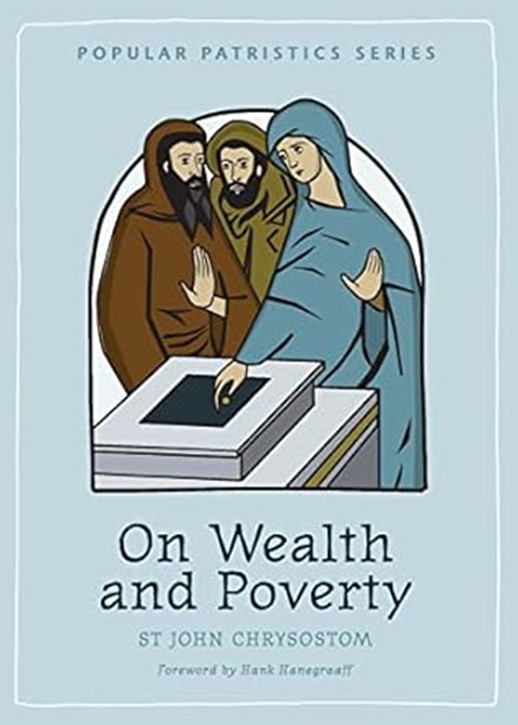
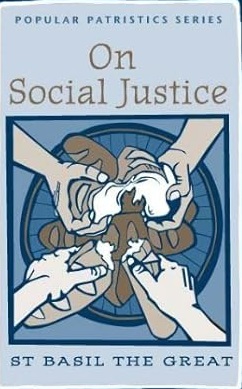
Although many charities cater to the wealthy, they often prefer giving to the arts. After all, feeding the starving leaves no legacy, no buildings bearing their name. Many universities have learned this, many will refuse the gift of buildings if they are not accompanied by a trust fund to fund their maintenance expenses.
Father Mack, who also comments on the Ladder of Divine Ascent, teaches us: “The more we have, the more complicated our lives become.” “The simpler we can make our lives, the more we can lower our financial obligations, the freer we become, the fewer cares we have, and the more we can pursue God without distractions!”
St John Climacus teaches us:
Step 16.7. “He who has conquered the passion of avarice has conquered care; but he who is bound by it never attains to pure prayer.”
Step 16.9 “I have seen how men of scant means enriched themselves by living with the poor in spirit, forgetting their first poverty.”
Our attitude to wealth matters. Jimmy Carter could have spent his retirement like many former Presidents, living in luxury, speaking for large fees, and serving on corporate boards. Instead, he retired to his humble middle-class house in his hometown of Plains, Georgia, founding the Carter Center in Atlanta, helping the cause of peace and philanthropy across the world, working to eradicate diseases in poor third-world countries, enlisting the help of their citizens in these endeavors.
Jimmy Carter’s Youth and Navy Years: From Plowing With Mules to Nuclear Submarines
https://seekingvirtueandwisdom.com/jimmy-carters-youth-and-navy-years-from-plowing-with-mules-to-nuclear-submarines/
https://youtu.be/em5snF_iKkE
Jimmy Carter Presidency, then Carter Center, Diplomacy and Charity
https://seekingvirtueandwisdom.com/jimmy-carter-his-presidency-and-founding-the-carter-center/
https://youtu.be/sN3MQevsDa4
Jimmy Carter: Autobiographical, Historical, and Humorous Reflections From His Daily Devotions
https://seekingvirtueandwisdom.com/jimmy-carter-autobiographical-historical-and-humorous-reflections-from-his-daily-devotions/
https://youtu.be/C2LPpDU7udY
Jimmy Carter Inspirational Daily Devotions: Bible Stories, Reflections on Historical Events
https://seekingvirtueandwisdom.com/jimmy-carter-inspirational-daily-devotions-bible-stories-reflections-on-historical-events/
https://youtu.be/b24kTvwmuU0
Jimmy Carter: Christmas in Plains Compared to Christmas in the White House and Afterwards
https://seekingvirtueandwisdom.com/jimmy-carter-christmas-in-plains-compared-to-christmas-in-the-white-house-and-afterwards/
https://youtu.be/C52gRWUTR68
Jimmy Carter, Memories of Sharecropping, Hoboes, New Deal, and Civil Rights in Rural Georgia
https://seekingvirtueandwisdom.com/jimmy-carter-memories-of-sharecropping-civil-rights-and-life-in-rural-deep-south-georgia/
https://youtu.be/wqy5wC_sA_w
Jimmy Carter, Raising Crops and Livestock, and Health and Hygiene, in Rural Georgia During the Depression
https://seekingvirtueandwisdom.com/jimmy-carter-raising-crops-and-livestock-and-health-and-hygiene-in-rural-georgia-during-the-depression/
https://youtu.be/P8CCK4cGlVw
Jimmy Carter on the Virtues of Aging and Retirement
https://seekingvirtueandwisdom.com/jimmy-carter-on-the-virtues-of-aging-and-retirement/
https://youtu.be/JozGKCnUyaI
Father Vassilios quotes from St John Chrysostom’s homilies on the Parable of Lazarus and the Rich Man, where “St John Chrysostom reminds us that it is not wealth, but the abuse of wealth, that is evil.”
St John Chrysostom teaches us: “Wealth will be good for the possessor if he does not spend it only on luxury, or on strong drink and harmful pleasures. If the wealthy enjoy luxury in moderation and distribute the rest to the stomachs of the poor, then wealth is a good thing.”
Father Vassilios teaches us, “The more we love our neighbor as ourselves, the more, in other words, we feel the needs of others as though they are our own, the less inclined we will be to consider our luxuries as more important than our neighbor’s basic needs.” [2]
Father Vassilios also refers to the collection of St John Chrysostom’s homilies on Lazarus and the Rich Man in his footnotes. We ponder our beloved saint’s reflections on how Christians should respond to the sufferings caused by natural disasters such as earthquakes to the debate between Leibnitz and Voltaire, and also our beloved saint’s reflections on reading the Scriptures, preaching, and the spiritual dangers of attending chariot races.
St John Chrysostom: Lazarus and the Rich Man: When Are the Poor Unworthy? On Wealth and Poverty
https://seekingvirtueandwisdom.com/st-john-chrysostom-lazarus-and-the-rich-man-when-are-the-poor-unworthy-on-wealth-and-poverty/
St John Chrysostom On Reading Scriptures and Preaching
https://seekingvirtueandwisdom.com/st-john-chrysostom-on-reading-scriptures-and-preaching/
St John Chrysostom, Voltaire, and Leibniz Ask: Why Would a Loving God Permit Earthquakes?
https://seekingvirtueandwisdom.com/st-john-chrysostom-voltaire-and-leibniz-ask-why-would-a-loving-god-permit-earthquakes/
Step 17. ON NON-POSSESSIVENESS, OR POVERTY
Father Mack studies Steps 16 and 17 together because while avarice is the spiritual illness, non-possessiveness is the cure.
As Jesus exhorts us on the Sermon of the Mount: “Do not lay up for yourselves treasures on earth, where moth and rust consume and where thieves break in and steal, but lay up for yourselves treasures in heaven, where neither moth nor rust consumes and where thieves do not break in and steal. For where your treasure is, there will your heart be also.”[3]
St John Climacus teaches us:
Step 17.3 “The non-possessive ascetic is a son of detachment,” regarding his possessions as if they were nothing.
Step 17.4 “A non-possessive man is pure during prayer, but an acquisitive man prays to material images.”
Once I heard a master salesman give this advice in a sales training seminar: Attach to your mirror pictures of those items you want to possess and imagine that in the coming months and years you will possess them. Aim for the stars! Imagine that you will soon be driving a luxury car, living in a mansion, and relaxing on your yacht! Is this perverse advice to pray without ceasing for greater wealth? Is this master salesman urging you to live for greater possessions? Will those who die with the most toys gain a favored station in heaven?
When pondering what to write about this chapter, I noticed someone who was reading Dale Carnegie’s 1936 book: How To Win Friends and Influence People? Should it be subtitled, How To Manipulate Others To Like You and Bless You With Wheelbarrows Full Of Money?
Dale Carnegie was not related to the robber baron Andrew Carnegie, who penned his 1889 essay, The Gospel of Wealth, where he urged the ultra-wealthy to practice responsible philanthropy to benefit the lower classes. Andrew Carnegie was known for his donations to black colleges, particularly Booker T Washington’s Tuskegee Institute. Today, Bill Gates of Microsoft fame has likewise dedicated his fortune to fighting third-world diseases.
Did his generosity excuse him from paying his workers slave wages? When Carnegie Steel busted their union in the 1892 Homestead Strike, Andrew Carnegie avoided blame by claiming that he no longer controlled the company bearing his name.[4]
Up From Slavery: Autobiography of Booker T Washington
http://www.seekingvirtueandwisdom.com/up-from-slavery-autobiography-of-booker-t-washington/
https://youtu.be/yxDnJ6sBoJc
Since God blesses those who are His faithful stewards, or so the prosperity preachers on TV will lead you to believe, the temptation is to believe the reverse, that those who are not blessed materially are not God’s faithful servants.
What does the prosperity gospel preach? If you are prosperous, then God has blessed you, and vice-versa. Wealth equals virtue, and virtue brings wealth, especially if you donate to the prosperity preacher.
But filling our bank accounts means filling our souls with the cares of this world, with little time left to care for others, as St John Climacus warns us:
17.6 “He who has tasted the blessings on high easily despises what is below. But he who has not tasted the blessings above finds joy in possessions.”
Step 17.14 “The love of money is called the root of all evil, because it produces hatred, thefts, envy, separations, enmities, storms, remembrance of wrong, hard-heartedness, murders.”
St John Climacus teaches us: Step 17.10. “Waves never leave the sea, nor do anger and grief leave the avaricious.”
Step 17.1. “Non-possessiveness is the resignation of cares, life without anxiety unencumbered” by possessions, “alienation from sorrow, fidelity to the commandments.”
Father Mack teaches us: “As our income grows, we should give more away rather than spending more on ourselves.” “For us in the world,” “our salvation depends on our almsgiving. Although we cannot live in absolute poverty,” “we can live generously.”
Father Mack is echoing the words of the angel who tells the first Gentile convert, Cornelius the Centurion, “Your prayers and your alms have ascended as a memorial before God.”[5]
St John Chrysostom, in his homilies on Lazarus and the Rich Man, “reminds us that those who practice voluntary poverty are the ones who are truly rich, because they are free of need and worldly concerns.”
St John Chrysostom teaches us: “If you see someone greedy for many things, you should consider him the poorest of all, even if he has acquired everyone’s money. If, on the other hand, you see someone with few needs, you should count him the richest of all, even if he has acquired nothing.”
Father Vassilios teaches us: “Voluntary poverty is a virtue because it is an expression of self-denying love: through ascesis we are able to live a frugal life, enabling us to give more to others. Poverty is therefore a sacrifice of the will, a surrender of our worldly desires for Love of God and neighbor.”[6]
DISCUSSING THE SOURCES
Both of these editions of the Ladder of Divine Ascent use similar translations, but each has its own thoughtful introductions, the introduction in the Classics of Western Spirituality is by Bishop Kallistos Ware. We find this work as easy to read as the works of the Stoic Philosophers that influenced Christianity and the monastic tradition, but we also have the commentaries by Father John Mack and Father Vassilios Papavassiliou, which are valuable because they reflect their experience as priests hearing confessions.
The Ladder of Divine Ascent is a classic monastic work written by St John Climacus for his fellow monastics in the seventh century, centuries before Emperor Constantine started the transformation of the Roman Empire into a Christian Empire. Since this is a manual meant for monastic monks, some common-sense allegorizing is needed to apply his advice to laymen living in the world. In his first Step, St John Climacus advises laymen that living a godly life is sufficient for salvation. Laymen benefit from studying the monastic classics like the Ladder of Divine Ascent, because marriage and living the Christian life is itself a type of monastic calling.
John Climacus: First Step of the Ladder of Divine Ascent
http://www.seekingvirtueandwisdom.com/st-john-climacus-first-step-on-the-ladder-of-divine-ascent/
https://youtu.be/Fco0W3bt5GA
St John Climacus sees the Christian life as progressing up the Ladder of Divine Ascent, beginning with a rejection of the selfishness of the world, then the importance of obeying the Lord’s commandments, and the godly injunctions of the church and those in authority, and repentance and perseverance through the trying times of our lives.
St John Climacus, Ladder of Divine Ascent, On Detachment, Exile, and Pilgrimage, Steps 2 and 3
https://seekingvirtueandwisdom.com/st-john-climacus-ladder-of-divine-ascent-on-detachment-exile-and-pilgrimage-steps-2-and-3/
https://youtu.be/qDtrgYmaAQU
Ladder of Divine Ascent, St John Climacus, Rung 4 on Obedience
https://seekingvirtueandwisdom.com/ladder-of-divine-ascent-st-john-climacus-rung-4-on-obedience/
https://youtu.be/_bjQcNvzb-c
St John Climacus: Ladder of Divine Ascent, Step 5, Repentance, and Perseverance of Winston Churchill
http://www.seekingvirtueandwisdom.com/st-john-climacus-ladder-of-divine-ascent-step-5-repentance-and-perseverance-of-winston-churchill/
https://youtu.be/NiuWNsy4x4Q
Ladder of Divine Ascent, Remembrance of Death, Joy Making Mourning, and Despondency, Steps 6,7, & 13
https://seekingvirtueandwisdom.com/ladder-of-divine-ascent-remembrance-of-death-joy-making-mourning-and-despondency-steps-67-13/
https://youtu.be/pFwC2nDf1CQ
We are then reminded that we should be free from anger, not holding grudges for the wrongs we suffer, and the strength of meekness. In the next step, we combat slander, lying, and gossip. We combat the passions of gluttony by moderate living and fasting, following a life of purity and chastity in this fifteenth step of the Ladder.
St John Climacus, Ladder of Divine Ascent, Freedom from Anger, Meekness, Remembrance of Wrongs, Steps 8 and 9
https://seekingvirtueandwisdom.com/st-john-climacus-ladder-of-divine-ascent-freedom-from-anger-meekness-remembrance-of-wrongs-steps-8-and-9/
https://youtu.be/2mEjh425sJk
St John Climacus in Ladder of Divine Ascent on Lying, Talkativeness, and Slander, Steps 10, 11 and 12
http://www.seekingvirtueandwisdom.com/st-john-climacus-in-ladder-of-divine-ascent-on-lying-talkativeness-and-slander-steps-10-11-and-12/
https://youtu.be/SLBIdDHRy3A
St John Climacus on Gluttony and Fasting, Ladder of Divine Ascent, Step 14, and Eating for Health: DASH diet
https://seekingvirtueandwisdom.com/eating-for-health-dash-diet-st-john-climacus-on-gluttony-and-fasting-in-ladder-of-divine-ascent/
https://youtu.be/KM0eMjE1fXc
St John Climacus on Love, Lust, and Marriage: Ladder of Divine Ascent, Step 15, on Purity and Chastity
https://seekingvirtueandwisdom.com/st-john-climacus-on-love-lust-and-marriage-ladder-of-divine-ascent-step-15-on-purity-and-chastity/
https://youtu.be/YOlrP6-6YP0
[1] https://en.wikipedia.org/wiki/Allegory_of_the_long_spoons
[2] St John Climacus, The Ladder of Divine Ascent, translated by Lazarus Moore, updated by others (Boston: Holy Transfiguration Monastery, 1991), Step 16, pp. 121-122, and Father Vassilios Papavassiliou, Thirty Steps to Heaven, The Ladder of Divine Ascent for All Walks of Life (Chesterton, Indiana: Ancient Faith Publishing, 2103), Step 16, pp. 134-137, and Father John Mack, Ascending the Heights, Laymen’s Guide to the Ladder of Divine Ascent (Ben Lamond, California: Conciliar Press, 1999), Steps 16-17, pp. 87-91
[3] https://www.biblegateway.com/passage/?search=matthew%206%3A19-21&version=RSVCE
[4] https://en.wikipedia.org/wiki/The_Gospel_of_Wealth
[5] https://www.biblegateway.com/passage/?search=acts%2010%3A4&version=RSVCE
[6] St John Climacus, The Ladder of Divine Ascent, Step 17, pp. 122-124, and Father Vassilios Papavassiliou, Thirty Steps to Heaven, The Ladder of Divine Ascent for All Walks of Life (Chesterton, Indiana: Ancient Faith Publishing, 2103), Step 17, pp. 138-141, and Father John Mack, Ascending the Heights, Laymen’s Guide to the Ladder of Divine Ascent (Ben Lamond, California: Conciliar Press, 1999), Steps 16-17, pp. 87-91.

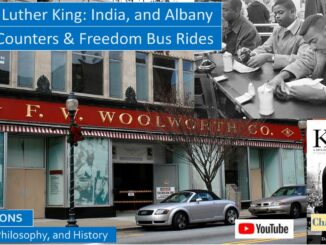
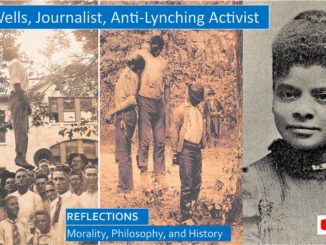
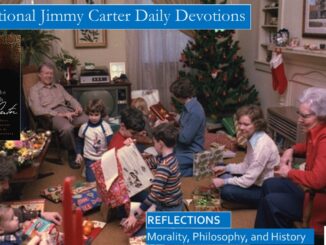
Be the first to comment